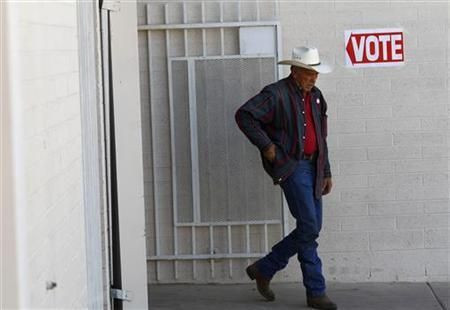
The U.S. Supreme Court ruled in a 7-2 decision on Monday that the state of Arizona could not require that would-be voters in federal elections prove their citizenship before being allowed to cast their ballot. In the majority opinion, Justice Antonin Scalia indicated that a 1993 federal law, the National Voter Registration Act, trumped an Arizona law that required voters to provide "satisfactory evidence" that they were citizens -- a category which could include documents or information on documents which are made available only to legal residents of the state, like birth certificates, passports, naturalization papers or driver's licenses. The federal law, by contrast, requires only that voters check a box indicating whether or not they are citizens of the United States and, in signing the form, swear under penalty of perjury that they are U.S. citizens. It does not mandate that prospective voters bring proof of citizenship.
Justice Scalia wrote that the words of the federal measure clearly stipulated that states were forbidden from "[demanding] that an applicant submit additional information beyond that required by the federal form" and said that states must "accept and use" the federal registration form.
RELATED: John Morton Resigns As ICE Director
According to the New York Times, Arizona officials had earlier argued that the state did "accept and use" the form and were within their rights in adding other requirements to state law. Arizona attorney general Thomas C. Horne said in March of the oath on the federal registration form, "It's essentially an honor system. It does not do the job." Scalia responded to this assertion in his writing by saying that understood in context, the "accept and use" phrase meant to signify that the federal form alone would be sufficient.
RELATED: Immigration Arrests To Be Made By Local Cops? House Hearing Held On GOP BIll To Give Cops Power
The case came to the Supreme Court after Arizona appealed a decision by the 9th U.S. Circuit Court of Appeals, which said that the National Voter Registration Act of 1998 displaced Arizona's Proposition 200, which was passed in 2004. The decision was received as a victory for the voting-rights advocates who had first challenged the 2004 law in addition to similar measures in other states. According to the Chicago Tribune, they had sued Arizona on behalf of a number of state residents who were US citizens but had their voter-registration applications rejected because they lacked a driver's license or passport.
RELATED: Senate Rejects Two Grassley Border Security Amendments
Justices Clarence Thomas and Samuel Alito were the two judges who dissented from the ruling. In his dissent, Thomas wrote that the Constitution "authorizes states to determine the qualifications of voters in federal elections, which necessarily includes the related power to determine whether those qualifications are satisfied."
© 2025 Latin Times. All rights reserved. Do not reproduce without permission.




